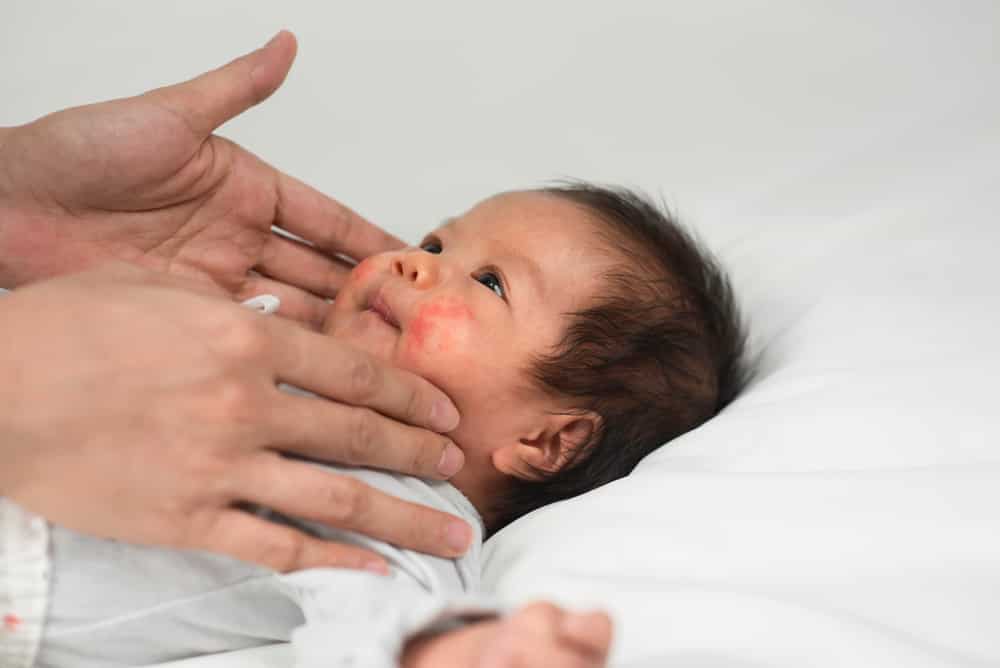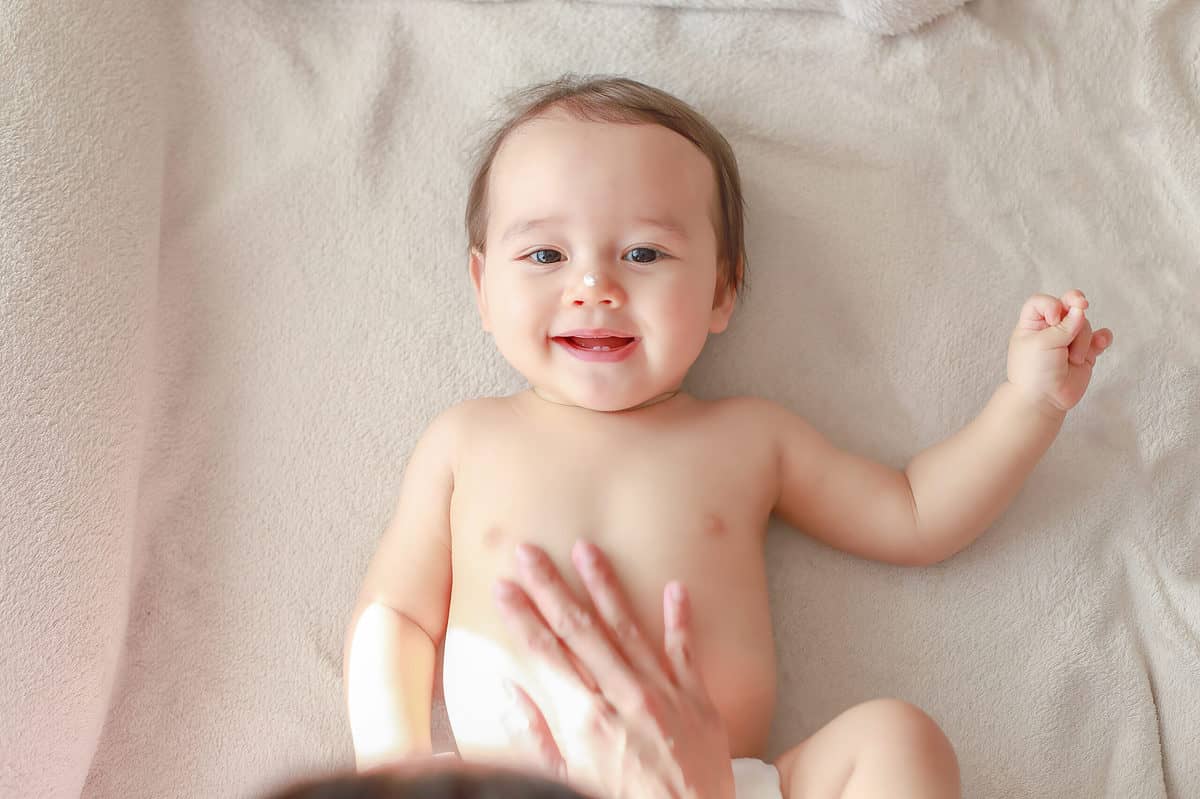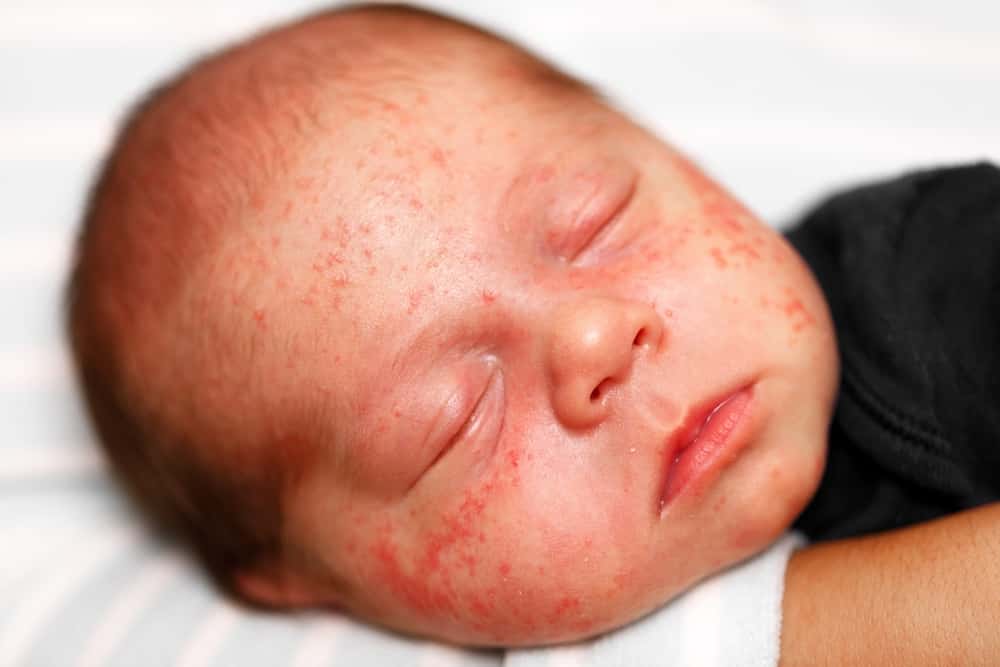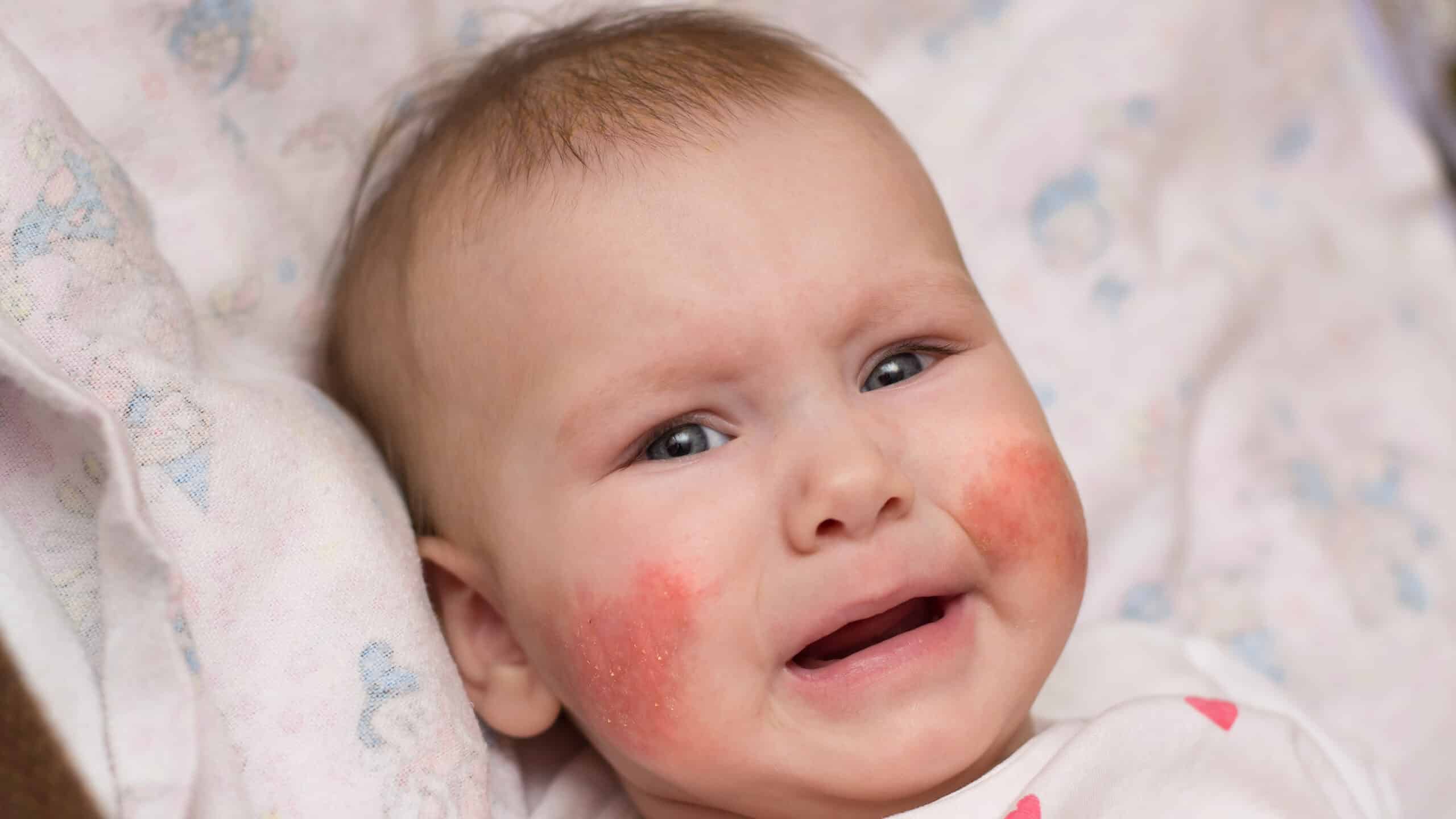Key Points
- Eczema usually begins appearing within the first six months. It can present as a rash or discoloring of the skin.
- Genetics, sensitivity to cold weather, and allergies are all reasons that eczema can appear.
- There is no one, universal cure for eczema; every baby is different and will respond to the various treatment options differently.
When you have a newborn baby at home, there are many things that can happen. New parents are always worried about things that pop up, unsure of what to do and how to treat them. One thing that is very common among young babies is baby eczema. Experts indicate that 9.6 million children under the age of 18 years have eczema. Eczema is a skin condition that can show up in many different ways in babies. Baby eczema begins to appear in babies as dry, flakey skin patches that can be pink or red. Oftentimes, eczema in babies appears in areas with moisture such as the crevices of their legs and arms. There are many different ways to treat a baby's eczema, but it's important to know that no treatment is universal—what works for one baby may not work for another.

Eczema can appear anywhere on the body but often appears in places with moisture.
©fotorawin/Shutterstock.com
Where Does Eczema Typically Appear on Babies?
Eczema usually appears in babies within the first 6 months. They appear as a rash, which can be bumpy, in patches. It can also cause hyperpigmentation, or discoloring, of the skin. Eczema can differ from baby to baby, but most often, eczema will appear on areas of the skin that frequently have moisture. This can be in arm crevices or leg crevices. In addition, eczema appears on both facial cheeks and a baby's buttcheeks. Sometimes, it appears on the scalp. However, it is important to differentiate between cradle cap and eczema in babies.
Eczema oftentimes bothers and can hurt babies because it harms the barrier on their already sensitive skin. The skin condition weakens the protective layer of the skin on babies. Babies can often be bothered and fussy when their eczema is bothering them.
What Causes Eczema in Babies?
There are many different reasons that a baby can develop eczema. For one, eczema can be hereditary. This means that it can simply occur based on a baby's DNA. If a parent had or has eczema, there is a good chance that their child may develop it at one point or another.
There are other causes of eczema in babies, as well. Cold weather often stimulates and can cause eczema flares, as cold weather causes dry skin. In addition, seasonal allergies or other types of allergies can cause eczema. Certain fabrics, fragrances, and chemicals in soaps and laundry detergents can also cause eczema. If your little one is sick with a virus or a bacterial infection, this can also stimulate eczema in babies. Their immune system response can be the cause of an eczema reaction.

Babies can develop eczema or it can happen due to genetics.
©Onjira Leibe/Shutterstock.com
How to Treat Your Baby's Eczema in 5 Steps
1. One thing to start with is to avoid allergens as much as possible. Buy fragrance-free and sensitive-skin soaps and laundry detergents that will keep their skin clear, clean, and safe. When using lotion, be sure to use lotion made specifically for babies, especially ones for sensitive skin.
2. Avoid putting babies in very hot baths. Lukewarm water is good, but when water is too hot or too warm, it can hurt and dry out the skin. In addition, avoid long baths. Having your baby in the water too long can also be harmful to their skin and cause eczema flares. In addition, when flare-ups are bad, putting your baby in an oatmeal bath can help soothe their skin.
3. When your baby is finished bathing or washing, be sure to pat their skin dry and not rub. Rubbing can cause friction which can cause rashes and breakouts on their sensitive, newborn skin.
4. Always moisturize after a bath and before bed. This allows the lotion and moisture to make their way into the skin and allow it to retain its natural moisture. Be sure to use a moisturizer that is catered to infants with sensitive skin. You can also purchase lotions that are specifically made for eczema.
5. Avoid tight clothing. Loose-fitting clothing is best when a baby has eczema because it avoids rubbing and friction on their skin. When clothing is too tight, the skin does not have room to breathe. In addition, wash all new clothing before your baby wears it. This allows for the chemicals and dyes to rinse before touching your baby's body.

Some babies do require medical treatment if eczema persists.
©Ruslan Ivantsov/Shutterstock.com
Some Babies do Require Medicine
Although avoiding certain irritants and chemicals can aid in your baby's fight against infant eczema, it does not always work for every child. Some babies do require special medicines and topical steroids to help speed up the healing process. Parents can go to a pediatric dermatologist to explore and discuss different treatment options for their baby.
A study conducted and published in The Lancet found that a biologic drug yielded promising results in treating of moderate-to-severe eczema in children from six months to five years. The study's results showed that the drug had reduced the children's symptoms by 75%.
There is No One Cure for Your Baby's Eczema
It's important to know that there is no definitive cure for infant eczema. Most children's eczema clears up on its own around 3 to 4 years old with support and effort from parents. There are, of course, exceptions. Some children continue to struggle with eczema well into their youth and even adulthood. In these specific cases, consulting a doctor is recommended.
Could it Be Something Else?
It's possible that your baby's skin irritation could be something other than eczema. It's important that you consult a pediatrician before settling on any diagnosis for your child. Never self-diagnose, unless you possess the necessary medical training to do so.
- Scabies: This happens when tiny mites burrow into the top layer of skin. Unlike with eczema, itching tends to get worse at night.
- Hives: Hives can lead to red or pink welts developing on your baby. This condition usually leads to swelling in other places, however.
- Netherton disease: This is a rare disorder that can cause the skin to look red and scaly.
- Cutaneous T-cell lymphoma: In some cases, early-stage cutaneous T-cell lymphoma presents with a rash or red, swollen skin. While this is definitely not the first diagnosis you should jump to, it's good to be aware of it in the event your baby's rash is especially persistent.
The image featured at the top of this post is ©alexeisido/Shutterstock.com
